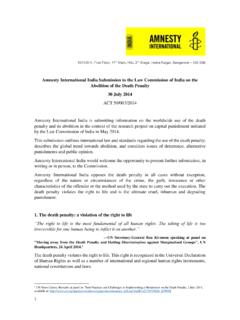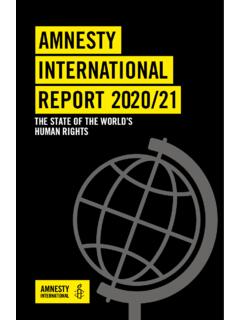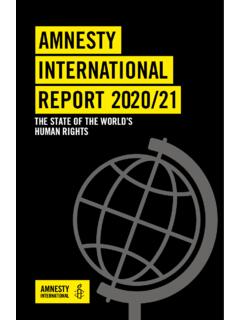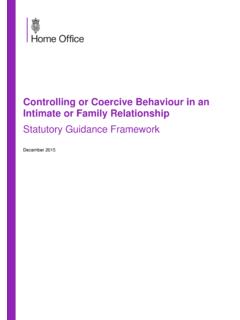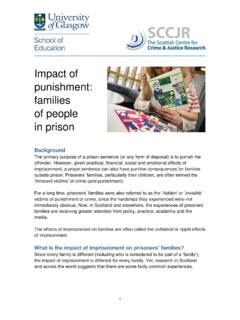Transcription of DOES THE DEATH PENALTY DETER CRIME?
1 THE DEATH PENALTYTHE ULTIMATE PUNISHMENTDOES THE DEATH PENALTY DETER crime ? GETTING THE FACTS STRAIGHT MYTHThe DEATH PENALTY deters violent crime andmakes society from around the world hasshown that the DEATH PENALTY has nounique deterrent effect on crime . Manypeople have argued that abolishing thedeath PENALTY leads to higher crime rates,but studies in the USA and Canada, for instance, do not back this up. In 2004in the USA, the average murder rate forstates that used the DEATH PENALTY per 100,000 of the population asagainst per 100,000 in states thatdid not use it. In 2003 in Canada, 27years after the country abolished thedeath PENALTY the murder rate had fallenby 44 per cent since 1975, when capitalpunishment was still enforced. Far frommaking society safer, the DEATH penaltyhas been shown to have a brutalizingeffect on society. State sanctioned killingonly serves to endorse the use of forceand to continue the cycle of violence.
2 MYTHThe DEATH PENALTY reduces drug March 2008, the Executive Director ofthe UN Office on Drugs and crime calledfor an end to the use of the DEATH penaltyfor drugs offences: Although drugs kill, I don t believe we need to kill because of drugs. The use of the DEATH PENALTY for drugoffences is a violation of international 6(2) of the International Covenanton Civil and Political Rights states: In countries which have not abolished the DEATH PENALTY , sentence of DEATH may be imposed only for the most seriouscrimes. In April 2007 , the UN SpecialRapporteur on extrajudicial, summary, or arbitrary executions, acting as anexpert witness in a challenge toIndonesia s Constitution, told theConstitutional Court that [d]eath is not an appropriate response to the crime ofdrug trafficking. Apart from Indonesia,China, Iran, Malaysia, Saudi Arabia andSingapore are some of the countries which execute people for drug , there is no clear evidence thatthe use of the DEATH PENALTY for suchcrimes acts as a stronger deterrent thanlong terms of are less likely to commit violentcrimes, including murder, if they know theywill face punishment by argument supposes that criminalsstudy and anticipate the consequences of getting caught, and decide that a longterm of imprisonment is acceptable,whereas execution is not.
3 Many crimes are committed on the spur-of-the-moment, leaving little opportunity forpotential punishments to influencewhether the crime is committed in the first place as criminals do not believe they will be caught and held to account. The DEATH PENALTY may even cause further violence. Execution is the ultimatesanction a state can inflict upon a criminals have knowingly committeda capital offence, they no longer have anyinterest in lessening their potentialpunishment by not committing furthermurders or other offences. For example, if armed robbery carries the DEATH PENALTY ,the robber loses nothing by committingmurders while attempting to flee. Index: ACT/015/2008 THE DEATH PENALTYTHE ULTIMATE PUNISHMENTMYTHThe threat of execution is an effectivestrategy in preventing people willing to commit large-scaleacts of violence aimed at inflicting terrorupon a society do so knowing that theycould come to serious physical harm andtherefore show little or no regard for theirown safety.
4 Executions of such peopleoften provide welcome publicity for thegroups they belong to and create martyrsaround which further support may berallied for their cause. Yet many countrieshave attempted to control terrorism byusing the DEATH PENALTY . In November2005, Iraq passed the Iraqi Anti TerrorismLaw. This law provides only a vaguedefinition of terrorism and lists a numberof terrorist acts all of which even thosewhere there has been no loss of life carry the DEATH PENALTY . Scores ofexecutions have been carried out in Iraqunder this and other DEATH PENALTY is fine as long as themajority of the public support International recognizes the rightof nations to create laws. However, suchlaws must be formulated within theboundaries of respect for human is littered with human rightsviolations that were supported by themajority but in modern times are lookedupon with horror. Slavery, racial segregationand lynching all had widespread supportin the societies where they occurred butconstituted gross violations of the victims human is understandable that populations lookto their leaders to take decisive actionagainst violence, and express anger atthose guilty of brutal crimes.
5 AmnestyInternational believes politicians shouldlead the way in standing up for humanrights by opposing the DEATH PENALTY andexplaining to their constituents why suchactions cannot be undertaken by the more than 30 years of research onthe DEATH PENALTY , Amnesty Internationalbelieves that public support for capitalpunishment is overwhelmingly based on a desire to be free from crime . This isillustrated by polls in the USA and othercountries which show significant drops in support for the DEATH PENALTY when lifeimprisonment without the possibility ofparole is offered as an alternative. In theUSA, a May 2006 poll by the Gallupcompany found support for the deathpenalty dropped from 65 per cent to 48per cent when life imprisonment withoutparole was offered as an option. MYTHE xecutions provide the most cost-effectivesolution to violent society cannot condone violence andsacrifice human rights as a cost-cuttingmeasure. The decision to take a humanlife should not rest on financial the DEATH PENALTY to reduceprison populations is futile.
6 For example,the USA has a prison population ofapproximately million but only around3,000 prisoners are condemned to the entire population of DEATH row wereexecuted, it would make no discernibledifference to the prison population.
